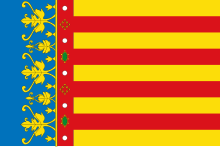Names of the Valencian Community
"Kingdom of Valencia" refers to the conquered territory by the Christian Catalan and Aragonese troops commanded by king James I in 1238.
The conquered territory was granted wide administrative, legal and political self-government within the structure of the Crown of Aragon as stipulated in the set of laws known first as Costums de Valencia.
Then, by the early twentieth century, Labor and Valencian nationalist movements picked up the term and gave it the modern cultural and political connotation.
The term became popular during the 1930s, and was widely used in academic, cultural and political papers and publications, most notably the Quaderns d'Orientació Valencianista journal, published by Editorial Estel, nowadays edited by the University of Valencia.
Nowadays, the term is still used, mostly in academia, encyclopedias in Catalan[14] (and occasionally in Spanish)[15] in the names of streets, plazas and avenues, by some political parties (e.g. the United Left of the Valencian Country), labor unions (UGT-PV, CCOO-PV, etc.
In that sense, "region" designated any state, country or nation (all previously used terms that designated the diverse territories of the Spanish Empire or under the king of Spain), regardless of their political and administrative nature of the territory, whereas "kingdom" was reserved to the particular State, country or nation governed by a monarch.
In Spanish, levante (llevant in Valencian) are easterly winds and, geographically speaking, anything coming from or originating in the east, such as the eastern slopes of a range (the western ones are called poniente).
In its attempt to homogenize the Spanish territory, the Francoist governments and media often used Levante to refer to the eastern Mediterranean coast of Spain.
Since Catalonia had a well defined identity already, Levante came to designate, roughly, the territories which used to make the Kingdom of Valencia and, often, additionally the Región de Murcia.
[18] Also, the oldest newspaper in the Valencian Community, edited in the city of Valencia is called Levante-El Mercantil Valenciano.
Given that center and right-wing political parties formed an absolute majority in the Congress, the Socialist Workers' Party (PSOE), reached a compromise with the UCD (by the proposal of deputy Emilio Attard), through which the term Regne de Valencia was replaced by Comunidad Valenciana ("Valencian Community", "community" as in "autonomous community") within the articles of the legal text, and the terms Regne de Valencia and País Valencià were included only as incidental mentions in the Preamble, so that whichever party was in power in a particular time would use whichever denomination it preferred.
Later on, by the mid and late 1980s, when the PSOE won absolute majorities both in the Spanish Parliament and the Valencian one, it decided to keep the existing solution unchanged rather than reopening the topic, which had been harshly fought over.






